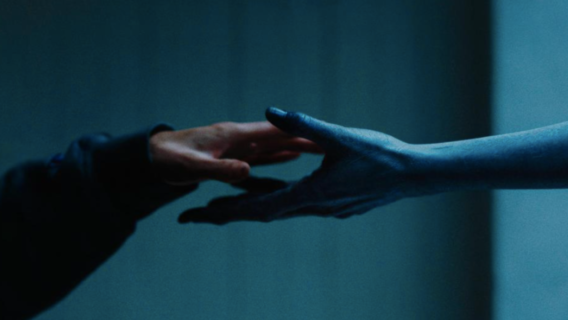
Since the release of The Babadook, we’ve seen a boom in trauma horror. Not trauma porn like Saw or Hostel, but trauma horror like Hereditary that’s centered upon deep emotional trauma, typically regarding family relationships. It’s an oversaturated market, with recent blockbusters like Imaginary trying (and failing) to tap into that so they can be part of the zeitgeist. It’s exhausting to see trauma used as a selling point rather than a starting point for a closer look at what it means to survive traumatic experiences. Thankfully, Benjamin Finkel fights back against trauma tropes in his feature film debut Family. Instead of a saccharine attempt to speak about the power of love, Finkel stares anticipatory grief, caretaking, and living with a sick parent right in the face. His film is disturbing, violent, and unflinching, if not a bit bloated in its approach.
Joanna (Cameron Dawson Gray (credited as Lucinda Lee Dawson Gray)) is a homeschooled only child who has just moved into a new house so her father Harry (Ben Chaplin) has access to better healthcare. He’s dying of brain cancer and Joanna’s mom Naomi (Ruth Wilson) is his sole caretaker, driving him to doctor’s appointments and surgeries, making sure he takes his pills, and helping him when he’s too weak to move. Unfortunately, in the chaos of caring for someone with a terminal illness, Joanna is a second thought, more of a nuisance than anything. So Joanna tries to stay quiet, searching for the blue birdhouse she can use to summon a good spirit to their house to protect her dad.
Also Read: ‘Oddity’ SXSW 2024 Review: Damian McCarthy’s Latest Is Really Damn Scary
But once she hangs up the birdhouse and whistles the summoning call, bad things start happening to and around Joanna. The family dog disappears. Joanna’s mom makes her a sandwich full of glass. Her father has a seizure and whispers horrible things in her ear. And yet when Joanna tries to explain what’s happening, she’s told she’s lying, that she was the one actually doing something wrong. Since we see the entire film and world through Joanna’s eyes, we’re never sure if what she’s experiencing is real or a sad child’s fabrication. Joanna’s world becomes suspended in dream logic as horrific things happen in the blink of an eye, feeling so real yet so alien at the same time.
It’s a narrative that could easily become melodramatic, but Finkel avoids that with his dedication to breaking genre film taboos. He’s never afraid to confront the horrific realities of living with a sick parent and the horrors of confronting death at such a young age through the lens of potential child abuse. Family is troubling, there’s no doubt about that, but it’s never sugar-coated to make it a more palatable experience. It’s brutally honest in its portrayal of illness, never trying to hide it for the sake of audience comfort.
Also Read: ‘Imaginary’ Review: A World Of Little Imagination
Wilson turns an expectedly stunning performance as a mom on the brink of absolute meltdown. She even has her own Toni Collette Hereditary monologue moment that elevates her into the pantheon of horror’s favorite complicated moms. Based on Finkel’s own mom who was the sole caretaker for her husband when he had cancer, Wilson embodies the exhaustion and rage of someone doing everything they can to keep their world afloat. Their empathy is drained and their patience is nonexistent, but they’re trying. In turn, Finkel always has Joanna looking at her mother not just as a monster, but as a deeply sad person.
Across from her is Gray who acts like she is in fact watching her own father die before her very eyes. For a young actor to convey such profound sadness and rage is impressive and Gray has to carry almost all of Family’s emotional weight on her shoulders. She rises to the challenge and then some, crafting an empathetic and interesting child character with the help of Finkel’s script. This is a film that treats kids as fully formed beings who deserve agency and love; they’re more than offspring to boss around and push to the side.
Also Read: ‘REVEIL’ Review: Don’t Play This Game If You’re Scared Of Clowns
The script’s honesty helps sell most of its horror until it takes a strange turn that feels much too big for the complex microcosm Finkel creates in this giant old house. While such a contrast could be an effective punch, here it falls a bit flat and confuses Finkel’s once-clear message about the horrors of watching someone’s final days. Too many ideas threaten to muddy an effective script, but thankfully the film ends quickly enough to not overburden it.
Family may be over-ambitious but it’s still incredibly unsettling in its violence. It’s confronting and honest, heart-shattering and terrifying. It follows in the footsteps of recent films like In My Mother’s Skin that aren’t afraid to confront the true cruelty of family. Finkel crafts a surprisingly fresh take on trauma-centric horror even if he includes one too many ideas. To see a new filmmaker already tackling such taboos with his first feature, I’m excited to see what he does next.
Summary
Family may be over-ambitious but it’s still incredibly unsettling and disturbing in its violence.
Categorized:Reviews


